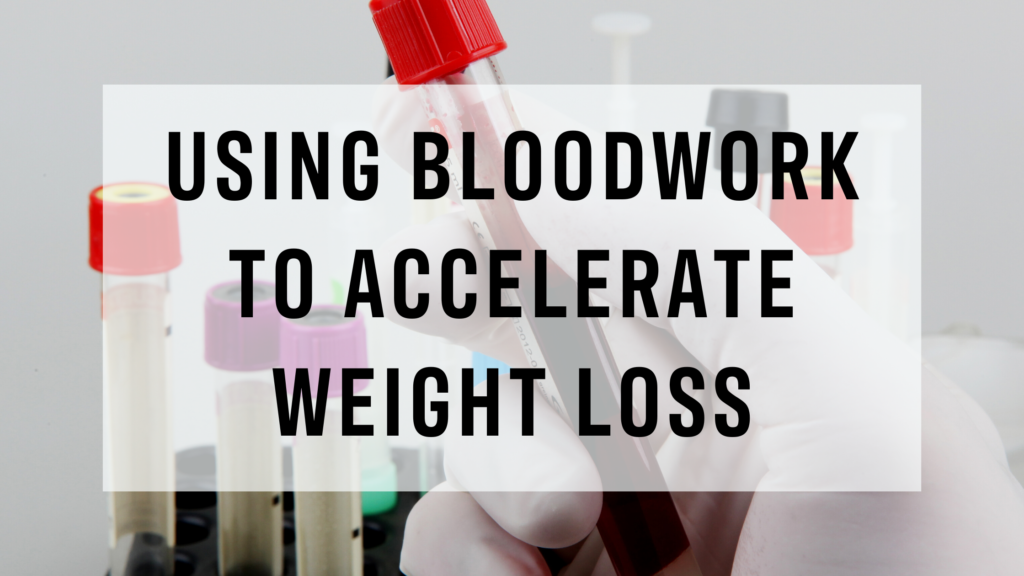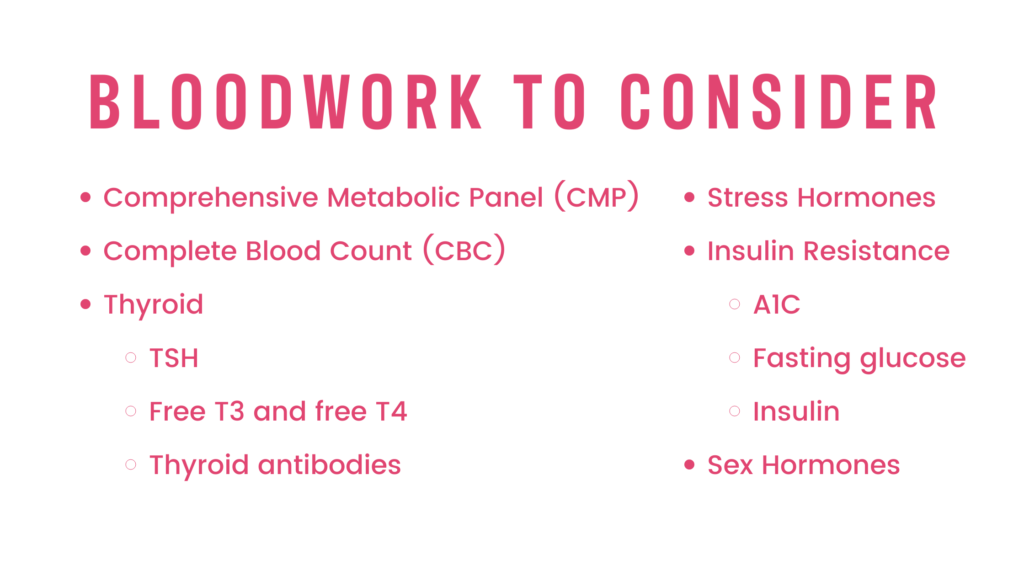
Using Bloodwork to Accelerate Weight Loss

So, you’ve been working toward a weight loss goal and made some initial progress…but now you’re at a standstill. You’ve hit the infamous plateau. Now what?
Well, first, this is completely normal and expected. Weight loss is almost never linear. However, if you’ve been consistent and patient for 12+ weeks with absolutely no changes, it might be time to “check under the hood”.
(Side note: this is also considering that you’re approaching weight loss in a sustainable way! Yo-yo dieting or anything extremely restrictive is your first problem to address.)
One of the easiest (and perhaps more affordable) ways to do some further investigating is by talking with your doctor and getting some blood work started.
Below are different categories/areas of bloodwork to consider and discuss with your practitioner.
Comprehensive Metabolic Panel (CMP)
This includes 14 different blood tests that all relate to metabolism. It measures glucose (which we’ll talk more about below), liver and kidney function, as well as fluid, electrolyte, and mineral status. Everything looked at will help ensure that your vital organs can filter out protein and waste products that are produced during metabolism and keep things operating smoothly. It will also check that the body is properly hydrated to support your metabolism. By the way, just because you drink a gallon of water a day doesn’t mean you’re hydrated (we need salt and minerals!)
Complete Blood Count (CBC)
This blood test measures the balance and concentration of white and red blood cells. If things are not balanced, the body cannot function as intended and weight gain will be difficult. Anemia can also be identified this way by checking iron levels. This could explain any potential fatigue or energy hindering weight loss goals.
Thyroid
How well your thyroid is functioning can definitely impact your ability to lose weight. In fact, it has almost everything to do with it because it plays a huge role in our metabolic rate.
If your thyroid is sluggish, your ability to burn fat is going to take a hit. In fact, it’s impossible to significantly lower body fat percentage with improperly diagnosed hypothyroidism.
With that being said, some labs you can request include TSH, free T3 and free T4, and thyroid antibodies including anti-TPO and TgAB.
What do each of these indicate?
TSH: This is your thyroid-stimulating hormone. The pituitary gland in the brain produces TSH, which signals the thyroid to produce thyroid hormones to work their magic in our cells. Your doctor will typically want your TSH to be within .5-5 mlU/L, however, a functional medicine practitioner would ideally want to be within a more targeted range.
A TSH above this range can be a sign that your thyroid is sluggish. And this makes sense because your brain is spitting out all this TSH, but the thyroid gland isn’t using it, leading to that higher TSH level in the blood. Check out this blog post to learn all things thyroid and what you need to know.
Free T3 and free T4: These are good to check because T4 is considered the thyroid hormone and T3 is the active thyroid hormone. Knowing these levels can tell us if the thyroid gland is producing enough of both in order to enter our cells and carry out important functions related to metabolism and more.
Thyroid antibodies: Checking these will identify any concerns for autoimmune diseases like Hashimoto’s or Grave’s disease, which would hinder your ability to lose weight without proper treatment.
Thyroid health is very tricky overall, and working with a functional medicine practitioner can be helpful if you have other persistent symptoms aside from difficulty losing weight. Sometimes labs can show up “normal,” so don’t give up and work with a practitioner who specializes in thyroid health.
Stress Hormones
If you think weight loss is just about “diet and exercise,” you’re missing the mark. Stress management is critical for sustainable weight loss, so first evaluating how well you are doing in this category is going to be helpful.
When it comes to bloodwork, you can test your cortisol levels and C-reactive protein.
High cortisol levels are detrimental to the body. How detrimental? Think destruction of muscle, anxiety, low libido, increased calcium loss from our bones, and increased stored fat in the belly. Cortisol also puts the body into that “flight or fight” response, which decreases your metabolic rate. When the body thinks something is wrong, it’s going to put fat loss on “the back burner.” It’s just not critical to surviving. We know that being chronically stressed is just a modern-day reality now, and it can affect our weight, mental health, and more.
C-reactive protein will help determine if there is a significant amount of inflammation going on in the body. Think of inflammation as mini-fires going on inside. The body views this as another emergency, so fat loss is not a priority. It wants to put out the mini-fires instead.
What can trigger those inflammatory responses? An infection, inflammatory diseases like rheumatoid arthritis or lupus, smoking, lack of exercise, overexercising, inadequate sleep, or poor stress management.

Insulin Resistance
If you’ve been hanging around with us for a while, you know how much we preach on the importance of blood sugar management for fat loss. If your weight loss efforts haven’t been prioritizing PHFF, make sure to work on this area first and foremost.
There are some labs that can be checked to make sure your body isn’t fighting you on managing blood sugar (which would impact fat loss).
Side note: elevated blood sugars throughout the day prevent the body from utilizing fat-burning-related hormones because it needs to use insulin more often, which is a fat-storing hormone.
A1C: This lab value represents how well your blood sugars have been managed on average over the past 3 months. A value below 5.7% is ideal. If your A1C falls between 5.7-6.4%, your body is insulin resistant and considered prediabetic. Working with your doctor and/or registered dietitian to improve this number will help your weight loss efforts and help prevent type 2 diabetes in the future.
Fasting glucose: Having a blood sugar or glucose level between 70-100mg/dL is a great sign that your blood sugars are managed well. If higher than 100mg/dL, your body may be more insulin resistant and again working to bring this down will be beneficial. Check out this post for all things nutrition and blood sugar. Staying active, getting enough sleep, and managing your stress are all key as well.
Insulin: Finally, checking your insulin levels can also be helpful. Although insulin is a very important hormone and we need it to survive, too much of it (like anything) isn’t a good thing. Too much insulin will encourage the body to store unused glucose as fat and also block stored fat to be used as energy. One of the first signs of insulin resistance is elevated insulin after a meal, followed by high fasting insulin in the morning.
Sex Hormones
For females, our sex hormones can definitely play a role in our ability to lose weight. Take testosterone for example. Maintaining good levels is crucial to build muscle (this increases metabolism) and losing fat. Low testosterone levels can be related to insulin resistance as well, which will hinder fat loss. Having low levels could also lead to poor motivation, mood, and energy, which are all very important in following through with healthy habits. Ask your doctor about checking your total and free testosterone.
Progesterone could be looked at, as it helps us use fat for energy and helps our cells use thyroid hormones. It’s referred to as the “anti-anxiety hormone” as well, so if these levels are off, it could have a domino effect on our stress levels.
Your overall hormonal health and balance are so important for achieving fat loss, so if you have concerns in this area, blood work can be a good place to start. Going beyond your blood work with a DUTCH test can also be a good idea.
Believe it or not, there are even more things that could be checked via blood work, but this is a really good starting list.
The intent of this post is not to motivate you to go get everything under the sun checked as soon as you stop losing weight. I really want to emphasize that most of the time, you don’t need to do any extensive blood work, and everything is fine! Prioritizing your metabolic health and PHFF can fix a lot of problems. BUT checking blood levels can be a great tool to help identify any roadblocks in your fat loss journey.
Remember too, blood work is not the be-all and end-all! Going beyond the blood is often necessary to get to some root issues. For example, checking our mineral status via hair sample can help us see what’s actually in our tissues vs. just the blood. Also, using a urine sample with the DUTCH test can also help us evaluate hormones even more accurately.
AND we are now able to order labwork in our VIP program! Included is HTMA and blood panel (GI map available to add on as well), lab interpretation with a dietitian, protocol, check-ins, coaching calls, and more! Learn more here.
Stay healthy,
-Elle, MM Coach

